





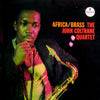
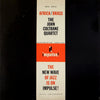
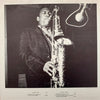
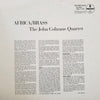
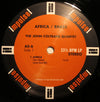
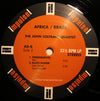
The John Coltrane Quartet – Africa / Brass
Rarity - Sealed
Soprano and tenor saxophone - John Coltrane
Trumpet - Booker Little
French horn - Julius Watkins, Bob Northern, Donald Corrado, Robert Swisshelm
Tuba - Bill Barber
Baritone saxophone - Pat Patrick
Piano - McCoy Tyner
Bass - Reggie Workman
Drums - Elvin Jones
Trumpet - Freddie Hubbard (B1)
Euphonium - Julian Priester (B1), Charles Greenlee (B1)
French horn - Jim Buffington (B1)
Piccolo, woodwinds - Garvin Bushell (B1)
Bass - Paul Chambers (B1)
Trombone - Britt Woodman (A1, B2)
Euphonim - Carl Bowman (A1, B2)
Alto saxophone, bass, clarinet, flute - Eric Dolphy (A1, B2)
Bass "Africa" - Art Davis (A1, B2)
Orchestration – Eric Dolphy, McCoy Tyner
Written by John Coltrane (A1, B2)
B1 is a traditional song
1LP, Gatefold jacket
Original analog Master tape : YES
Heavy Press : 180g
Record color : Black
Speed : 33 RPM
Size : 12'’
Stereo
Studio
Record Press : Pallas
Label : Speakers Corner
Original Label : Impulse!
Recorded on May 23 (B1) and June 7, 1961 (A1, B2) at Studio Van Gelder Studio Englewood Cliffs, New Jersey
Engineered by Rudy Van Gelder
Original session produced by Creed Taylor
Reissue produced by Michael Cuscuna
Liner notes by Dom Cerulli, David A. Wild
Photography by Pete Turner
Art direction by Hollis King
Graphic design by Jackie Thaw
Originally released in September 1961
Reissued in January 2006
Tracks :
Side A:
1. Africa
Side B:
1. Greensleeves
2. Blues Minor
Reviews :
“John Coltrane's debut for the Impulse label was a bit unusual, for the great tenor and his quartet were joined by a medium-sized backup group on Eric Dolphy arrangements of "Africa," "Greensleeves," and "Blues Minor." "Africa" in particular is quite memorable although Coltrane would not pursue any further recordings in this direction in the future, making this a change of pace in his discography.” AllMusic review by Scott Yanow.
"Following the enticing release of an unheard live recording from the John Coltrane Quartet with Eric Dolphy last month, it may interest listeners to explore what else the mighty Trane had been up to over the course of that same year. The fascinating performance was captured by ambitious young engineer Richard Alderson, and came at a point in the saxophonist's career that was sandwiched between his unprecedented album Africa/Brass (1961) and a game-changing residency at the Village Vanguard which took place later that very same year. It is the former of these creative bursts that we'll focus on today and how, even though the LP was critically panned at the time, it would go on to be a pivotal marker in the construction of Impulse! Records — 'the house that Trane built'.
Having been bought out of his recording contract with Atlantic by Impulse! executive Creed Taylor, the musician was particularly keen to inaugurate his tenure on this fledgling label with a striking and bold new sound. For his first appearance in the studio as leader since recording My Favourite Things (1961) over half a year before, Coltrane gathered eighteen of the best musicians he could assemble for two remarkable sessions in May and June of 1961 at legendary producer Rudy Van Gelder's studio in Englewood Cliffs, New Jersey. The result was abstract, harsh and often challenging music which delicately balanced the equally vital roles of the Coltrane quartet with the additional brass elements of the larger ensemble. Initially, the composer Gil Evans had been scouted for the task of orchestrating the album's arrangements. Following his lack of response, this duty fell to Trane's bandmate McCoy Tyner and relative newcomer Eric Dolphy, who took on the role of preparing instrumental parts based on the pianist's dynamic chord voicings.
Across the world, the postwar period had largely been one of postcolonial reckoning which never was more concentrated than in the buildup to the 1960s — a notion reflected in the album's striking dissimilarity to almost everything that had come before it. Just like the process of decolonisation, the music of Africa/Brass is at times peaceful and orderly, whilst at others it can be hefty, protracted and often violent. Unsurprisingly, this record came as a shock to jazz critics at the time, with many reviewers simply unable to grasp the magnitude of the performers' intentions. However, it was due to his own firebrand vision that Coltrane was able to establish himself as one of the most readily-skilled and chameleonic artists of the era, with later records, such as Ballads (1963) and A Love Supreme (1965) confirming his position within the critical and commercial and halls of fame. None of Trane's later success would have been possible, however, without the adeptness and expertise he so passionately set out with at the time of Africa/Brass in 1961, arguably the most innovative year of his career.
You can glimpse the kind controlled chaos the musical soulmates of Trane and Dolphy were capable of manifesting on the hectic rendition of 'Africa' which appears on the new Village Gate album for the only known live recording of the piece to date (which was also performed prior to the studio album's release). What it lacks in lineup, though, this performance more than makes up for in energy and dedication. But, for the real deal, tune in to The Complete Africa/Brass Sessions (1995) for a taste of the prowess with which the pair effortlessly conjure up aspects of Ellington, Evans and Mingus before transforming them all into something completely radical and unique." Presto Music, review by Barney Whittaker
Ratings :
AllMusic : 4.5 / 5 ; Discogs : 4.68 / 5 ; Down Beat : 2 / 5 ; The Rolling Stone Jazz Record Guide: 3 / 5 ; Encyclopedia of Popular Music : 4 / 5



